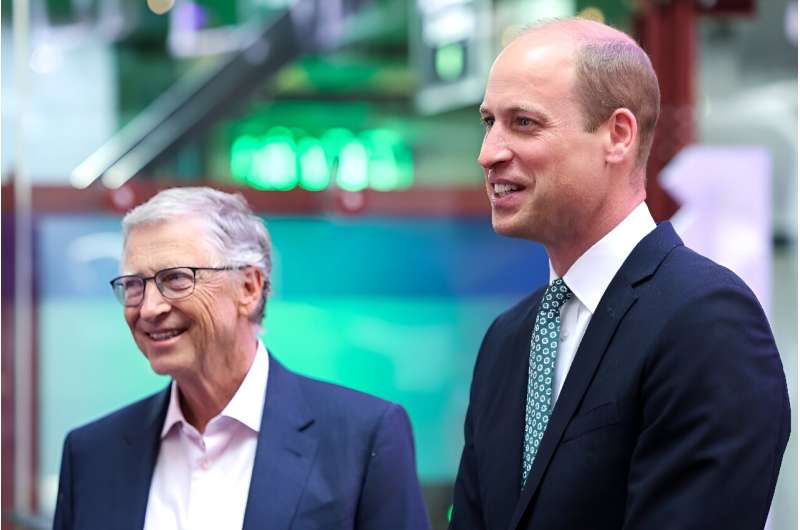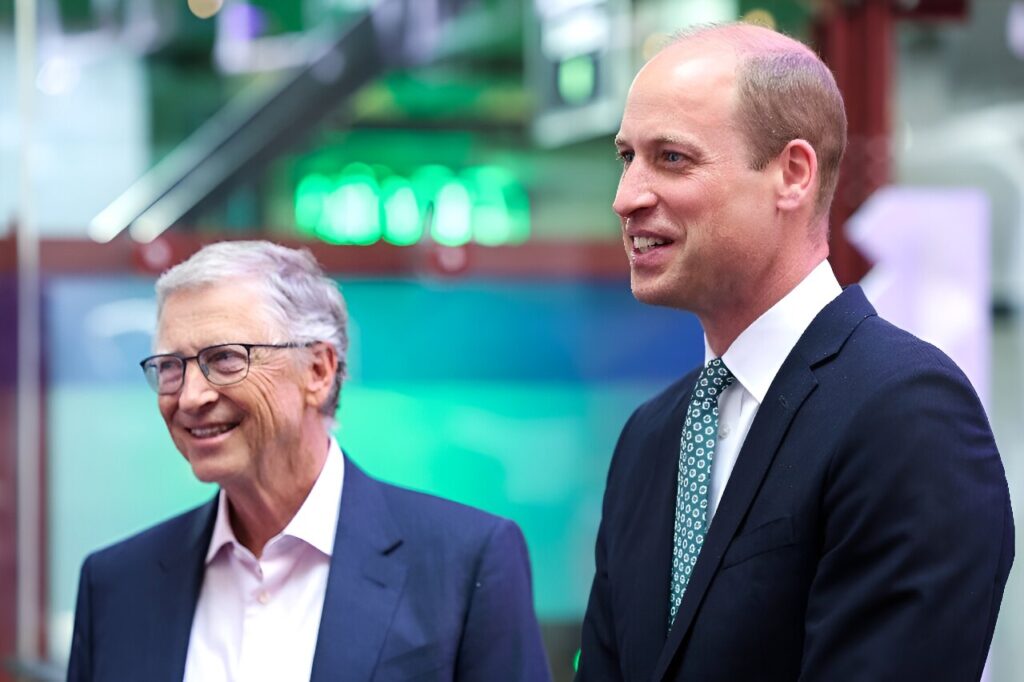
Microsoft founder Bill Gates (left) and Britain's Prince William attended the Breakthrough Energy Summit in London on Thursday.
Microsoft co-founder Bill Gates on Thursday called on investors to back cutting-edge climate technologies that he says will drive a “green industrial revolution” and the next wave of global prosperity.
Over three days at the upscale London venue, Gates profiled more than 100 companies that are working to reduce greenhouse gas emissions from the carbon-intensive sectors most responsible for climate change.
Gates is a firm believer in the power of innovation to drive breakthroughs in highly polluting industries like manufacturing, energy and transportation.
He is the single largest investor in the fund he launched in 2015, which has invested approximately $2.2 billion in early-stage technologies including low-carbon cement, zero-emission aviation and sustainable building materials.
But to deploy these technologies more quickly and on a larger scale, Gates is looking to expand his investor base from venture capitalists to pension funds and sovereign wealth funds.
Many of the innovations he funds are still at the lab level and have not produced any return on investment, let alone contributed to reducing greenhouse gases that cause global warming.
Critics say the climate technology is a costly obstacle at a time when deep cuts in emissions and funds to help developing countries deal with climate change are needed.
Gates acknowledged that innovation alone won't solve the problem, but he said there are reasons for optimism.
Some of these companies have already rolled out innovations, while others have shown great progress in a short space of time, he said.
“I think the clock is moving forward thanks to human ingenuity,” he told reporters at the closing ceremony of the Breakthrough Energy Summit, held in London's 19th century shipyards.
“I think we can provide all the services that humanity wants without increasing costs and with zero emissions. I think it's reasonable to be optimistic.”
“Green Industrial Revolution”
Less than a decade ago, investor interest in climate technology had all but disappeared, Gates said.
He raised $1 billion in initial investment alongside other ultra-rich investors, including Amazon's Jeff Bezos and Alibaba's Jack Ma, and the first summit, held in 2022, attracted hundreds of attendees.
But industry figures show that investors beyond deep-pocketed philanthropists are also starting to turn their attention to climate change startups that have long been deemed too risky.

Microsoft co-founder Bill Gates attended the Breakthrough Energy Summit in London on Thursday.
At the London event, Gates gathered about 1,500 executives from banks, government-backed investment funds and major corporations.
In one pavilion, potential investors toured a hydrogen-electric aircraft engine designed by ZeroAvia, a block of low-carbon steel made by Boston Metal, and a giant magnet used by Commonwealth Fusion Systems to test nuclear fusion power.
The Source, a company that uses “hydropanels” to collect water from atmospheric vapor, quenched thirst on hot summer nights.
The sudden surge in investor interest is clear and understandable, said Tim Heidel, CEO of Gates-backed Vere, a company that is researching high-temperature conduction to improve power transmission.
“They have the opportunity to build one of the greatest companies on the planet,” Heidel told AFP at the evening of the reception, where guests sipped cocktails with names like “Electric Elixir” and listened to a string quartet.
“If you help solve climate change, you have the opportunity to build a very large, very profitable company,” Gates told investors.
“I think it is no exaggeration to say that what you are seeing from these companies is the foundation of a green industrial revolution,” he said in his opening speech, as he took the stage to the sound of The Beatles' “Revolution.”
'Live or die?'
This optimism stood in stark contrast to the diplomatic climate talks hosted by the UN.
Key negotiations in June on new targets for climate finance ended in sharp disagreement over how much rich countries should pay poorer countries for their emissions.
Veteran U.S. diplomat John Kerry said it would be up to the private sector, not governments, to raise the trillions of dollars needed each year to meet the challenge, and that new technologies would drive that progress.
“This is not a normal technology mission. This is literally a matter of life and death,” a former U.S. climate change envoy said Thursday.
This year is on track to be the hottest on record, with floods devastating large swaths of the planet and record-breaking heat waves hitting much of Europe, Asia and Latin America.
Unless urgent emissions cuts are made this decade, the world risks exceeding 1.5°C warming above industrial levels, the baseline set by the Paris Climate Agreement.
Julia Raynaud, senior director at Breakthrough Energy, said the time has come to “double down” on taking early-stage technology from prototype to power grid.
“It has taken less than 30 years to develop solar power to its current level,” she told AFP.
© 2024 AFP
Citation: 'It's not crazy to be optimistic' about climate tech, Gates tells investors (June 28, 2024) Retrieved June 28, 2024 from https://phys.org/news/2024-06-crazy-optimistic-climate-tech-gates.html
This document is subject to copyright. It may not be reproduced without written permission, except for fair dealing for the purposes of personal study or research. The content is provided for informational purposes only.



